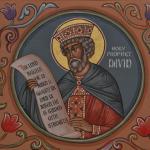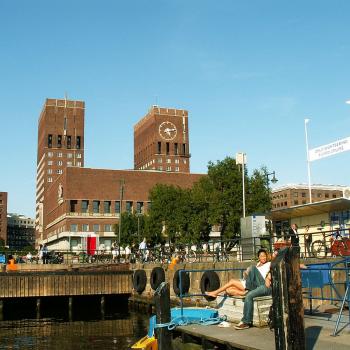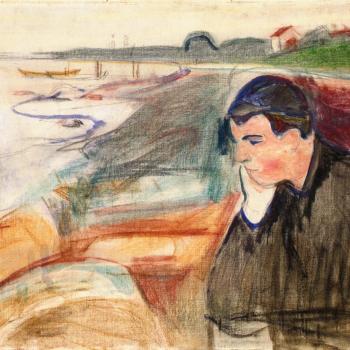- What was your experience of religion as a child inside and outside the household?
It should be said, and I don’t know how briefly, that several religious timelines (and accompanying modes of practice) overlapped unevenly in my nuclear family: 1) my father was not Syrian, though he was Sephardic and clung—let’s cut out the adverbial middleman and say desperately–to some sense of a continued Sinaitic tradition that had passed through the desert and the split kingdom and the schism of Christianity and the sacking of Jerusalem by the Romans and the exiling into Babylon and Persia and Arabia and so and so forth through Maimonides in Fustat and Moses Almosnino in Constantinople and Umberto Cassuto in Florence and Sabato Morais in Philadelphia and Matloub Abadi in Aleppo and Brooklyn, NY; 2) my mother was Syrian, though her family had for some time forgotten or otherwise let up on their religion in their two decades spent in the part of Northern California that was once a relative wasteland as far as observant Judaism was concerned (but which is now overrun with Israelis who work for startups), 3) my father had spent some ten years (maybe more?) in a litvak (Lithuanian) yeshiva in Baltimore called Ner Yisroel—Candle of Israel, in Ashkenazi trope—where he looked the part of any other of those strange beings that newspaper calls ultra-Orthodox Jews, complete with a hat and a white button down shirt on which stains of many days’ use in many a filthy and cholent-smelling cafeteria; in addition to these he acquired the intellectual vocabulary of Briskerism—the dominant mode of Talmud study in yeshivas worldwide, so named for the tiny Russian town where all the richness and variousness of Rabbinic literature was hardened and boiled into scientific categories so that any one segment of Talmud could be subject to rigorous practicable study without the student’s needing to master any sort of language training in Aramaic or grounding in any of the many hermeneutic traditions that proceeded Brisk and its famed Volozhiner Yeshiva, the model upon which my Dad’s in Baltimore was evidently based, 4) while my father had abandoned that mode of religion in favor of a sort of Sephardic nationalist alternative that he alone imagined was combatable with the intellectual and religious tenor of thinking American Jews (it wasn’t, at least not fully, hence no. 5), it had not wholly abandoned him: thus his distaste for evolution but deep respect for Maimonides’ skill as an eleventh-century physician at the Sultan’s court; thus also his phases, which were ours anyway, by which for some years we were forbidden to watch TV downstairs (though every Syrian family did this) because it was seen as publicly admitting and thus sanctioning the sin; some years he or my mother would have me forfeit my laptop for the duration of the Sabbath so that in order to whittle the long hours I had to hide in my closet and hope my toneless strumming of a fuzzy electric guitar could not carry into the room where they were celebrating the Sabbath day in deep sleep and redeeming dreams, 5) my father saw my mother’s father and their family as representing an authentic Sephardic-Syrian tradition that I would not find in my by-majority Syrian Sephardic school or in any of the many Syrian-Sephardic rabbis I knew; all these were Ashkenazified beyond repair, he claimed (and who would know better than a former convert to Ashkenazism?); instead I had to hold fast to the tradition as imparted onto me by my father in those dark hours of Friday evenings that I so dreaded and that he called “studying”; 5) my father had come to believe that religious life was analogous to the Matrix metaphor—yes, from the action adventure film; would that he could add Keanu Reeves and Mr. Miyagi into the chain of Jewish tradition….—whereby public life, which had to be conducted on the basis of several extended and ever expendable compromises, but which also had to take place among Syrian Jews of similar ethnicity and faith even if they had foolishly abandoned their true heritage for that of the shtetl; private life, on the other hand, conducted as it was between the safe and soundless walls of suburban homes across the 5 miles of Syrian households between our neighborhood and the shore, could honor the full complexity and controversy of Sephardic Jewish tradition; you could say things that you would deny saying, argue what you would not amongst your friends defend; a sort of double-life is desirable, he had said more than once, and to test him I asked, when during our study of the Book of Daniel (which he compared to an action movie!) he had been lecturing me on the essential idol worship of images, icons, and collective symbols (I think the section we were reading was one of Nebuchadnezzar’s dream in which several leapfrogging empires were represented in succession)—I asked, but what about the Star of David, and he responded that the Star of David would best be left off any flag we’d call our own, better yet that we’d have no flag and no symbol, that we would be a mamlekhet kohanim ve-goy kadosh (Exodus 19:6); 6) when in my first year of high school we visited Australia for our winter vacation, the first in a series of increasingly ambitious and nontypical extended and exhausting trips abroad, on a Saturday in January on which Australia Day had fallen and our hotel was some ways away from the festivities, we took a local train and then private taxi on the Sabbath, a sinful act that my father explained to both myself and my sister as “wrong, but we’re going to be honest about it.” As for outside the home, some of the above applied: that is, I could find some continuity from my father’s religion, made up as it was by crisscrossing and various non-Syrian influences, to the so-called “white” (as opposed to black) hat Syrians who likewise valorized their version of Sephardic heritage, voted for Republicans, and liked to ruffle the feathers of several largely ritual controversies (one debate about which I can barely stand to hear more of is whether the events relayed in the Bible should be considered historical or canonical in some determinative sense—this is what happened, and thus we do this; in this way outsize weight is heaved over such relatively uninteresting moments as whether Bilaam’s donkey spoke, whether Mt. Sinai “really” happened, and so on)—but this said, on the whole my time in school was subject to the double life mentioned above. Most of the rabbis in my yeshiva were black hats; certainly, the rabbi in our synagogue was. A sort of self-relieving mocking motion became the norm whenever that rabbi would get up to speak and, in what might otherwise amount to a joke, tell his kindergarten stories and debase in the process the religion we supposedly shared with him. This was not a rarity; it happened often, so often that it itself became the subject of frustration: a cousin of mine cannot stand to hear anymore how stupid everyone is and how dumb the tradition has become, he says he just “wants to pray.” He likes the music, and who could blame him? Syrian liturgy is the best music there is.













